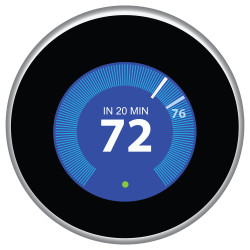Top Class Actions’s website and social media posts use affiliate links. If you make a purchase using such links, we may receive a commission, but it will not result in any additional charges to you. Please review our Affiliate Link Disclosure for more information.

U.S. District Judge Beth Labson Freeman found that plaintiff Justin Darisse’s allegations failed to satisfy several requirements for bringing a claim as a class action lawsuit.
According to the judge, Darisse’s allegations that the Nest Learning Thermostat does not reduce cooling and heating costs as advertised failed to satisfy class action requirements for commonality, typicality, adequacy or predominance.
The arbitration clause included in Nest’s sales terms blocks Darisse’s claims from being common to his proposed Class, Judge Freeman said. That clause requires any relevant claim to be heard via arbitration rather than in court.
It also waives the claimant’s right to class action litigation. Darisse’s claims can’t be common with potential Class Members who would be bound by that arbitration clause, the judge said.
Judge Freeman also found Darisse failed to present evidence that Nest allegedly made false representations uniformly to the entire Class. He therefore can’t claim that all Class Members relied on those representations to their detriment, the judge reasoned.
As for typicality, Judge Freeman found Nest has unique defenses specific to Darisse’s own claims, defenses that make his claims atypical of the proposed Class.
The judge cited the shortage of data about Darisse’s use of his own Nest thermostat, as well as the fact that in some months his savings met or exceeded Nest’s representations. Darisse also admitted he did not use all the thermostat’s energy-saving features that he could have, the judge said.
Due to weaknesses in Darisse’s own case, Judge Freeman said she doubted whether he could fairly and adequately represent the interests of his proposed Class. She also found his allegations raised questions of law or fact that predominantly implicate his own interests rather than those common to the entire Class.
Darisse initiated the Nest false advertising class action lawsuit in March 2014. He says he bought a second-generation Nest Learning Thermostat in the fall of 2013, relying on advertising he saw on the Nest website that told him he could save about 20 percent on his heating and cooling bill.
He says the advertisements also told him he could save an average of $173 annually and that “Nest saves energy. Automatically.”
Darisse says his own energy costs failed to live up to those representations.
In 2014, his savings compared to what he paid before he installed the Nest thermostat fluctuated between 4.7 percent and 22.2 percent, he claims.
Then in 2015, he says, his savings maxed out at nine percent.
Were it not for Nest’s representations about the Nest thermostat’s performance, Darisse claims he would have stuck with his $30 Honeywell thermostat instead of paying $249.99 for a Nest.
The proposed plaintiff Class would have encompassed all persons who purchased a Nest first or second generation thermostat from Nov. 1, 2011 through Feb. 1, 2015.
Darisse is represented by attorneys Scotto Bursor, L. Timothy Fisher, Yeremey Krivoshey and Annick Persinger of Bursor & Fisher PA and by Jennifer Sprengel of Cafferty Clobes Meriwether & Sprengel LLP.
The Nest Thermostat False Advertising Class Action Lawsuit is Justin Darisse v. Nest Labs Inc., Case No. 5:14-cv-01363, in the U.S. District Court for the Northern District of California.
ATTORNEY ADVERTISING
Top Class Actions is a Proud Member of the American Bar Association
LEGAL INFORMATION IS NOT LEGAL ADVICE
Top Class Actions Legal Statement
©2008 – 2024 Top Class Actions® LLC
Various Trademarks held by their respective owners
This website is not intended for viewing or usage by European Union citizens.














